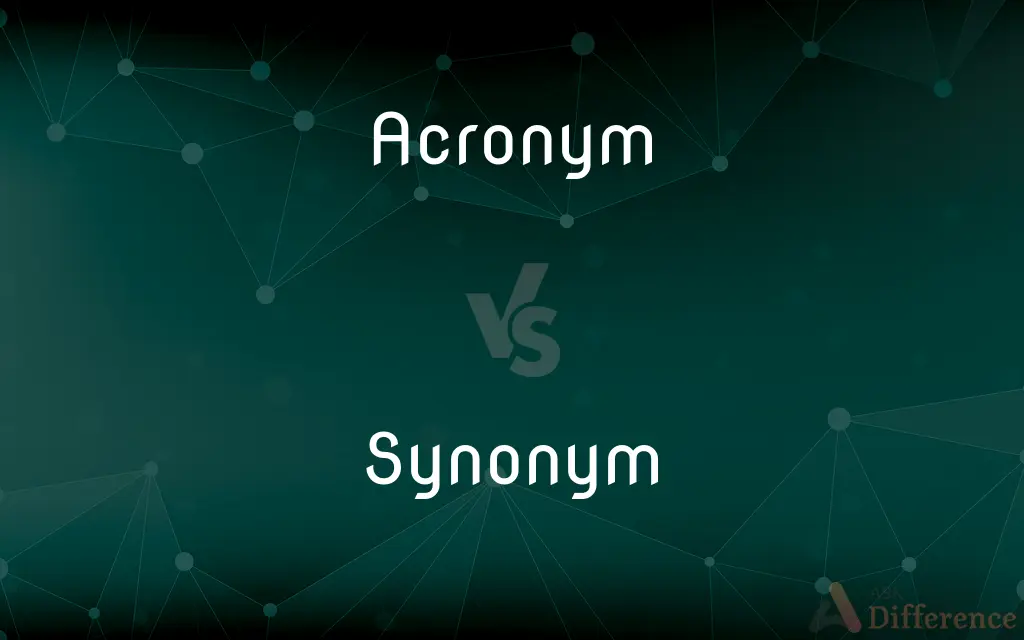Acronym vs. Synonym — What's the Difference?
Edited by Tayyaba Rehman — By Fiza Rafique — Updated on February 23, 2024
An acronym is a word formed from the initial letters of a phrase, made to be pronounced as a word (e.g., NASA), while a synonym is a word having the same or nearly the same meaning as another word (e.g., "happy" and "joyful").

Difference Between Acronym and Synonym
Table of Contents
ADVERTISEMENT
Key Differences
Acronyms are created by taking the first letters of each word in a phrase and combining them into a new word that is pronounced as a whole. This linguistic shortcut is often used to simplify the names of organizations, technologies, or processes, making them easier to remember and communicate. For instance, "NASA" stands for National Aeronautics and Space Administration, and "laser" stands for Light Amplification by Stimulated Emission of Radiation.
Synonyms, on the other hand, are words that have similar meanings and can often be used interchangeably in sentences without changing the sentence's overall meaning. The use of synonyms enriches language, allowing for more precise and varied expression. For example, the words "big" and "large" are considered synonyms in many contexts. Synonyms can vary in terms of connotation, register, and usage depending on the context, providing depth and variety to language.
The primary function of an acronym is to abbreviate and streamline communication, especially for lengthy or complex terms. They are particularly useful in written language, where space and reader attention are limited. Acronyms make it easier to reference complicated concepts or organizations without having to use their full names repeatedly. This efficiency is valuable in professional, technical, and academic fields, where specific terms and entities are frequently mentioned.
Synonyms play a crucial role in avoiding repetition and enhancing the nuances of language. By choosing among synonyms, writers and speakers can adjust the tone, style, and clarity of their communication. Synonyms allow for subtle distinctions in meaning and emotional expression, providing speakers and writers with tools to tailor their language to their audience and intent.
Acronyms condense language and make communication more efficient, while synonyms expand language, offering a palette of options for expression. Both are essential for effective communication but serve different purposes: acronyms for brevity and clarity, especially concerning specific names or terms, and synonyms for richness and precision in language use.
ADVERTISEMENT
Comparison Chart
Definition
A word formed from the initial letters of a phrase, pronounced as a word.
A word that has the same or nearly the same meaning as another word.
Purpose
To abbreviate and simplify communication.
To provide variety and nuance in language, avoiding repetition.
Examples
NASA (National Aeronautics and Space Administration), RADAR (Radio Detection and Ranging).
Happy - joyful, quick - fast.
Usage
Common in technical, professional, and academic contexts.
Used in all types of communication to enrich language and clarify meaning.
Type
Linguistic shortcut for phrases.
Linguistic variety for expressing similar concepts.
Compare with Definitions
Acronym
A word formed from the first letters of each word in a phrase.
SCUBA stands for Self-Contained Underwater Breathing Apparatus.
Synonym
A word that means the same or nearly the same as another.
Intelligent is a synonym for smart.
Acronym
Streamlines communication.
RAM is quicker to say than Random Access Memory.
Synonym
Enhances language variety.
Using rapid instead of fast can alter the tone of a sentence.
Acronym
Pronounced as a single word.
LASER is often used in everyday language without spelling out its full form.
Synonym
Helps avoid repetition in speech or writing.
Alternating between joyful and happy keeps language interesting.
Acronym
Used to simplify complex names or phrases.
NATO for North Atlantic Treaty Organization.
Synonym
Can have different connotations.
Slender vs. skinny in describing physique.
Acronym
Can become a standard word.
Radar has transcended its original acronymic status.
Synonym
Allows for nuanced expression.
Enraged provides a stronger emphasis than angry.
Acronym
An abbreviation formed from the initial letters of other words and pronounced as a word (e.g. ASCII, NASA).
Synonym
A synonym is a word, morpheme, or phrase that means exactly or nearly the same as another word, morpheme, or phrase in the same language. For example, the words begin, start, commence, and initiate are all synonyms of one another; they are synonymous.
Acronym
A word formed by combining the initial letters of a multipart name, such as NATO from North Atlantic Treaty Organization or by combining the initial letters or parts of a series of words, such as radar from radio detecting and ranging.
Synonym
A word or expression that serves as a figurative or symbolic substitute for another
"Romeo has become a synonym for any youthful lover" (Harry Levin).
Acronym
(linguistics) An abbreviation formed by the initial letters of other words, sometimes exclusively such abbreviations when pronounced as a word (as "laser") rather than as individual letters (initialisms such as "TNT").
Synonym
A word whose meaning is the same as that of another word.
Synonym
(databases) An alternative (often shorter) name defined for an object in a database.
Synonym
One of two or more words corresponding in meaning but of different languages; a heteronym.
Common Curiosities
Can an acronym have synonyms?
Yes, different acronyms can refer to the same concept but are not synonyms in the traditional sense. For example, "FAQ" and "Q&A" serve similar purposes but are structured differently.
Are all abbreviations acronyms?
No, not all abbreviations are acronyms. Acronyms form pronounceable words from initials, whereas abbreviations can be shortened forms (e.g., "Dr." for Doctor) or initialisms (e.g., "FBI").
Can a word be both an acronym and a synonym?
In rare cases, an acronym can become synonymous with a similar term but generally serves as a standalone representation of a specific phrase.
How do synonyms affect the tone of a message?
Synonyms can significantly affect the tone by offering words with different connotations or levels of formality, allowing the speaker or writer to fine-tune their message.
Can the meaning of an acronym change over time?
Yes, the popular usage of an acronym can shift, and it can take on new meanings unrelated to its original definition.
What is the main difference between an acronym and a synonym?
An acronym is a shorthand for a phrase, formed by initial letters, while a synonym is an alternative word with a similar meaning.
Are acronyms always capitalized?
Acronyms are usually capitalized when formed, but some have become lowercase as they've entered common usage (e.g., "laser").
How do I choose the right synonym?
Choosing the right synonym involves considering the context, the desired tone, and the specific nuances of each word's meaning.
Why are synonyms important in writing?
Synonyms enrich writing by enhancing its readability, preventing repetition, and allowing for more precise and varied expression.
How do synonyms and acronyms contribute to language evolution?
Both play roles in language development: acronyms by creating new words from existing phrases and synonyms by expanding the lexicon and flexibility of expression.
Share Your Discovery

Previous Comparison
React vs. Act
Next Comparison
Wood vs. WoodsAuthor Spotlight
Written by
Fiza RafiqueFiza Rafique is a skilled content writer at AskDifference.com, where she meticulously refines and enhances written pieces. Drawing from her vast editorial expertise, Fiza ensures clarity, accuracy, and precision in every article. Passionate about language, she continually seeks to elevate the quality of content for readers worldwide.
Edited by
Tayyaba RehmanTayyaba Rehman is a distinguished writer, currently serving as a primary contributor to askdifference.com. As a researcher in semantics and etymology, Tayyaba's passion for the complexity of languages and their distinctions has found a perfect home on the platform. Tayyaba delves into the intricacies of language, distinguishing between commonly confused words and phrases, thereby providing clarity for readers worldwide.













































